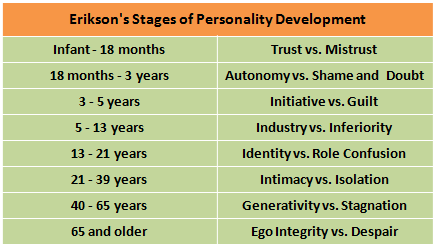Learning theories
Under this section you can review theories that fit into idiographic approach, such as operant learning theory, Bandura’s social learning theory or Erikson’s eight stages of personality development theory.
Bandura's Social Learning Theory
Albert Bandura (1986) one of the advocates of social learning theories argued that individuals learn new behaviours through socialization. He defined socialization as the process through which an individual’s pattern of behaviour and their values, attitudes and motives are influenced to conform with those seen as desirable in a particular organization, society or subculture. According to his theory much learning takes place when individuals observe what other people do and note the consequences of their behaviour. In his perspective, individuals construct through observation and experience internal models of environment and plan courses of action accordingly.
Skinner's Operant Learning Theory
Operant-learning theory offered another view of social learning. People learn behaviour because external stimuli reinforce and punish the behaviour. Reinforcement increases the likelihood of the behaviour in the future whereas the punishers decrease likelihood of the behaviour in the future.
.png) |
For example, if a boy is rewarded for sitting quietly in a class then he is apt to sit quietly again in order to obtain a reward. In the context of this theory 'sitting quietly' is called operant whereas the reward is called reinforcer. Reinforcement can be positive and negative. When something pleasant is given it is called a positive reinforcer whereas if something is taken away in order to reinforce the behaviour then it is negative reinforcer. Punishers can be again positive or negative. Positive punishers are when something unpleasant is given to a human to decrease certain pattern of behaviour and negative when something pleasant is taken away. The proper application of reinforces and punishers develops complete behaviour patterns that form an individual’s personality. Skinner argued that humans repeat acts that that lead to favourable outcomes and suppress those that lead to negative results.
Erikson’s Theory
Erikson’s theory is a good example of the idiographic approach. He viewed personality development as continuing throughout life. He was interested in the effect of experiences on the development of the self concept and how different individuals resolved personal conflicts. He identified eight stages of life development (see figure below).
According to Erikson, personality is the outcome of eight life stages each of which has its own distinctive characteristics. He divided stages into two parts - childhood and adulthood stages. The childhood stages are concerned with development of trust, autonomy, initiative and industry whereas the later stages focus on identify, intimacy, Generativity and integrity. As you can see from the figure below each stage focuses on resolution of dilemmas i.e. autonomy versus doubt.
 |
He proposed that each developmental stage builds on the successes of the previous stage nevertheless developments in one stage don't end when the next begins. Instead developmental preoccupations emerge and overlap with previous stage and continue after another stage emerges. They may emerge later in life if a previous resolution fails. He argued that all eight stages of life produce a healthy personality nevertheless difficulties in earlier stages may produce problems later on. His theory emphasises the results of both development and changing social expectations as individuals’ age. It not only makes considerable sense in terms of face validity but also links with other research indicating that individual’ motivations and goals change with age.

